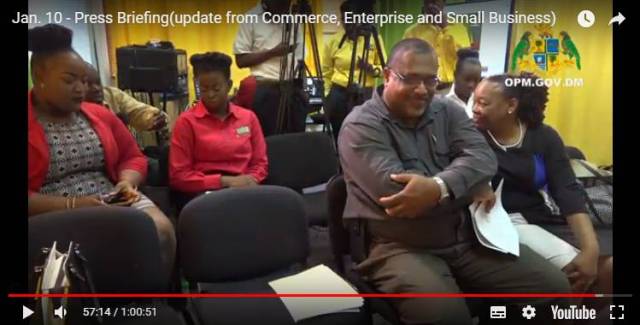 "Several countries like Dominica...are affected by a basic economic reality which causes genuine journalism to be practised almost entirely by the state." [Dominica Office of the Prime Minister video]
"Several countries like Dominica...are affected by a basic economic reality which causes genuine journalism to be practised almost entirely by the state." [Dominica Office of the Prime Minister video]
[This is an excerpt from an article in the special edition of The Round Table: The Commonwealth Journal of International Affairs on media freedom across the Commonwealth]
Across the OECS [Organisation of Eastern Caribbean States] region which comprises several countries the size of Dominica, government generally controls terrestrial television either entirely or partially though a public–private partnership, such as that which exists in Grenada (GBN). There is also another peculiar scenario that is best exemplified in Guyana where terrestrial television licences have been available for some time; however the offering amounts to little more than a re-broadcast of cable offerings with little local content, or news items that repeat government’s news releases.
An examination of the management structure of government owned media entities reveals a level of unsophistication in terms of management which facilitates direct control by a Prime Minister or Minister of ‘Information’. There is no filter that approaches the independence of the BBC Board of Governors and the best case scenario is a Board of Directors that answers to a Minister either in a corporate capacity or as a section of the Public Service. In such an environment direct and indirect Ministerial influence over editorial content has become the norm in situations where ‘satellites’ are not directly installed inside media houses.
In an ideal situation, this less desirable scenario would be offset by the existence of a parallel private media environment that offers greater opportunities and financial rewards. It is, however, generally the case in this sub-region that government is the preferred media employer with a capacity to offer greater stability and higher levels of remuneration. The journalist who seeks a rewarding career in journalism therefore faces a choice between economic survival and a nobler path which would not likely endear him or her to the government of the day.
The sub-regional response to this has been a professional migration to state media, while private media has degenerated into a mass of foreign content in the television arena and an abundance of ‘call-in’ programmes in the realm of radio. These programmes do offer some hope for media freedom; however, the ease and availability means that propaganda can counter propaganda with little in the way of research or production to generate either interest or balance. Worse yet, competing political parties have found it prudent to establish competing radio stations which broadcast competing political messages with little in the way of entertainment or information value.
One of the more insidious practices recently developed is often referred to as ‘pay for play’ for which there is, of course, no concrete evidence. It would, however, appear that in some media houses where journalists are less-well compensated or perhaps believe themselves to be less-well compensated than they should be, a story, flattering photo or indeed even an attractive headline can be ‘purchased’. This, of course, works equally well for the suppression of unflattering stories and is highly effective in an environment where the media product is small and lacks diversity.
More recently the online facilities have become popular and these offer a glimmer of hope in pursuit of media freedom; however, the ease of access to these facilities has meant that we now have several online facilities competing in small markets for comparatively smaller fees. Several of these online entities are therefore one-person operations that are either wholly sponsored by specific interests or lack the production capability to engage with issues beyond the publication of a release of a single interview with an ‘expert’ on a controversial subject.
Peter Wickham is a political consultant based on Barbados.



